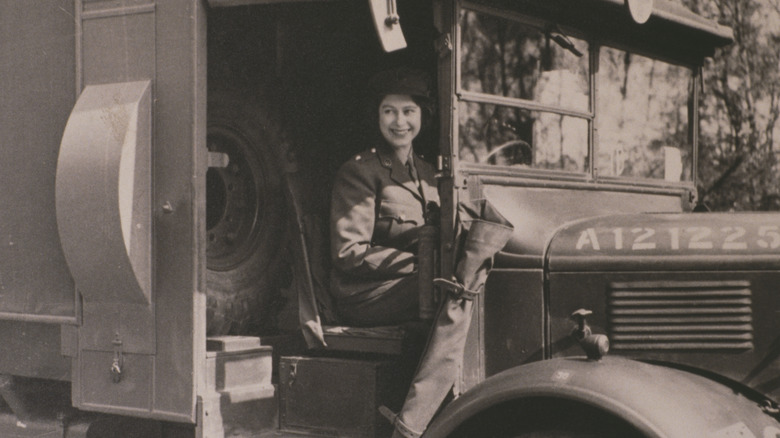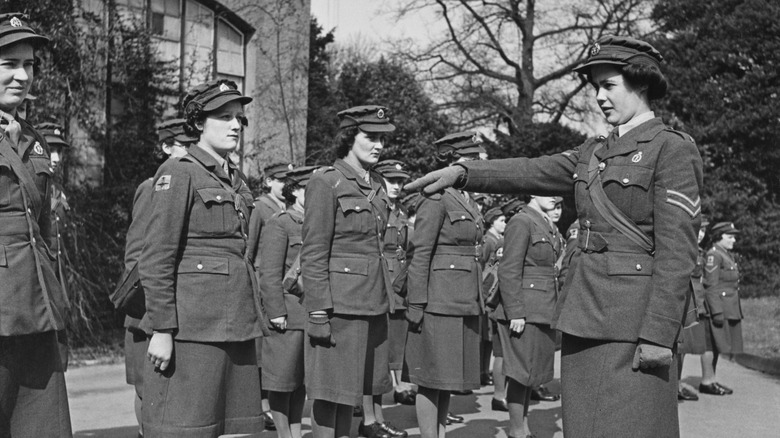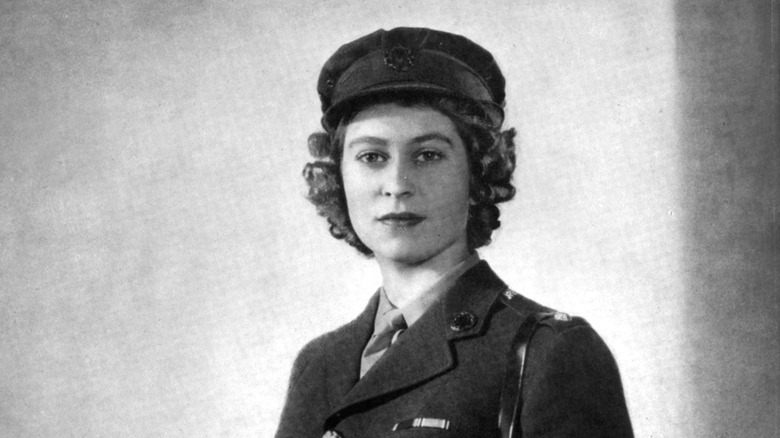The Skills Queen Elizabeth II Learned As A Military Truck Mechanic
Picture a king in medieval times and an image of an armor-clad man on horseback leading soldiers into battle may come to mind. That portrayal isn't too far-fetched, and many of Europe's monarchs had historically commanded their armed forces during times of conflict. Some, including Richard the Lionheart and Richard III, even died on the battlefield during these wars. The times have changed, though, and that includes how militaries operate. In recent centuries, rulers have tended to take a backseat during times of unrest, leaving command to their generals.
While it's safe to say that you won't see King Charles III leading a cavalry charge, Britain's current royal family does still have strong ties to the armed forces. Charles III himself is legally commander in chief, while his siblings and son William hold ceremonial roles in the army, Royal Air Force, and Royal Navy. Some of Charles' close relatives have also seen active duty. His son Harry notoriously took part in two tours of Afghanistan, something he has spoken about on multiple occasions. As well, and long before his reputation was sullied by scandal, the king's brother Andrew served with the Royal Air Force during the Falklands War. His father Philip was part of the navy in World War II, and his mother, Queen Elizabeth II, also broke a number of military boundaries (via BBC).
The late queen was the first female member of the Royal Family to see active duty, having served in World War II. At the age of 16, the queen was given an honorary military role in the Grenadier Guards, according to The National World War II Museum. She then became a full-time active member of the king's armed forces by joining the Auxiliary Territorial Service (ATS) at the age of 18 in an attempt to do her bit and help her nation in the war against Germany and its allies.
The women of the ATS were vital to the war effort
Britain's Auxiliary Territorial Service had many duties, including radio operation, assisting with anti-aircraft guns, and operating the spotlights that helped pick out German aircraft during raids. It was formed in 1938, the year before World War II started. The logic behind the ATS' formation was simple: women were eager to help the country against Hitler and men were needed for the front lines.
By forming the ATS and allowing women to conduct several important non-combat roles, thousands of troops were made available for front-line duties. The women weren't considered volunteers, either, but instead given status as fully fledged members of the British Army. Not all of the women joined by choice, however; some were conscripted after conscription was extended to include women ages 20 to 30 in 1941 under the National Service Act. By the time the war ended in 1945, more than a quarter of a million women had served. The ATS itself lasted another four years before it was dissolved and replaced by the Women's Royal Army Corps in 1949 (via the National Army Museum).
What Queen Elizabeth II did during World War II
When the war broke out, Queen Elizabeth II was in her early teens. As a result, she was evacuated to the countryside like many British youngsters while her parents remained in London to show solidarity. Her initial contribution to the war effort centered around a radio broadcast she and her sister Margaret conducted for the BBC. During the broadcast, Elizabeth and her sister did what they could to boost the morale of other children in similar situations. She later enlisted with the ATS and despite her royal status, she wasn't given any special treatment. The then-princess Elizabeth was given the rank of Second Subaltern, which is traditionally a junior officer role one rank below Lieutenant.
During her time with the ATS, the future queen's duties were centered around vehicles. According to The Express, she was tasked with maintaining several different types of military vehicles, including transport trucks and ambulances. Elizabeth also learned to drive every vehicle she worked on, so while most of the world may have known her as a loveable grandma with a fondness for corgis, old Lizzie was actually more than capable of taking a transport truck across miles of rough terrain and dealing with any mechanical issues that cropped up along the way (via Royal.uk). As cool as it is, that's not even the most surprising thing about the queen. If picturing an elderly monarch showing you how to change a tire is odd, imagine her slaughtering you at Wii Bowling.


